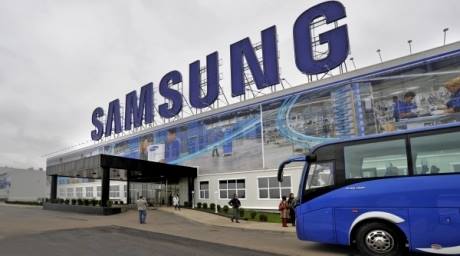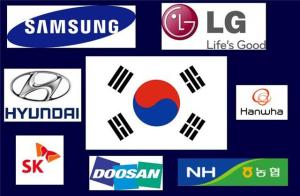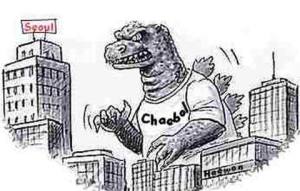
ONE NATION, UNDER THE CHAEBOL
by Third Bass
Aweek ago a friend passed on an intriguing post from the Global Voices website about a new piece of proposed legislation seeking to strike back at Korean consumers taking their business overseas. It appears that, in order to skirt the significant markups on consumer electronics, younger consumers are increasingly utilizing overseas internet retailers such as Amazon, and this is creating quite a bit of consternation among the denizens of Korea Inc. For those that reside in the ROK, the atmospheric prices―relative to those in the U.S. at least―of computers, smartphones, speakers, autos, clothing, etc., is hardly shocking news. However, those unacquainted with shopping in Korea may be puzzled to learn that even Samsung, LG and Hyundai products sell at prices often two to three times greater than those charged in the U.S. market. In fact, one disgruntled Korean consumer cited in the story points to a Korean brand TV selling for roughly $5,900 in Korea and $1,550 in the U.S. This difference is stark. 
The article rings the alarm of the rather chilling prospect of the Korean government creating ‘blacklists’ of consumers who have the temerity to utilize legal means to save thousands of dollars on their purchases; for me this issue gets to the heart of the good and the bad of Korea’s recent economic history and the public’s Janus-faced relationship with the chaebol (Korea’s giant corporate conglomerates). One the one hand, firms like Samsung are the embodiment of Korea’s status as an advanced, global economic power and thus a source of national pride. On the other, they represent the deep seated cronyism of the Korea political economy and an increasingly calcifying class structure. The chaebol, and their outsized influence on Korean society, are rooted in Korea’s development model, which saw the state commandeer society’s economic assets and direct them towards funding the growth and expansion of these economic behemoths. I should note that as someone who has studied development economics for years and is currently writing a dissertation largely focused on Korean development, I would like to offer a big tip of the hat to Korea for accomplishing an elusive goal that literally hundreds of nations have set out to achieve (and almost none succeeding): rapidly moving up the value added chain and going from a producer of trinkets and t-shirts to one of luxury cars and smartphones in a just a few decades.
 In my opinion, the most important thing the Korean government did was to keep the control over productive assets largely in Korean hands, often purchasing technology licenses or forcing foreign investors into joint ventures with Korean firms, rather than letting large multinationals come in and run amok in the domestic marketplace. This allowed the state to bolster firms seeking to move into producing higher value goods. Second, the Korean government should be lauded for tactfully fighting off U.S. political pressure for rapid liberalization. These pressures began to mount in the mid-80s and were often backed-up with threats by U.S. trade envoys of severe reprisals. Perhaps the Korean government’s approach to handling U.S. economic demands is best described as ‘bend but don’t break’. Total capitulation to U.S. entreaties could have gutted Korea’s nascent auto and electronics industries, which are now major global competitors.
In my opinion, the most important thing the Korean government did was to keep the control over productive assets largely in Korean hands, often purchasing technology licenses or forcing foreign investors into joint ventures with Korean firms, rather than letting large multinationals come in and run amok in the domestic marketplace. This allowed the state to bolster firms seeking to move into producing higher value goods. Second, the Korean government should be lauded for tactfully fighting off U.S. political pressure for rapid liberalization. These pressures began to mount in the mid-80s and were often backed-up with threats by U.S. trade envoys of severe reprisals. Perhaps the Korean government’s approach to handling U.S. economic demands is best described as ‘bend but don’t break’. Total capitulation to U.S. entreaties could have gutted Korea’s nascent auto and electronics industries, which are now major global competitors.
That said; this largely successful development model has yielded a host of legacies that linger to this day and create problems for the Korean state at both the domestic and international level. Domestically, the state-chaebol nexus which forms the backbone of Korea Inc. has spawned mega-firms that consistently trample over laws and regulations with little or no accountability. Korea expert Samuel Kim has described the chaebol as a “Frankensteinian deus ex machina,” in that these creations of the state are such significant sources of GDP, that any efforts to rein them in are tempered by concerns over potential damage to the economy. Further, the chaebol (as in the Global Voices story) are increasingly the focal point of societal consternation about the growing inequality in Korea, exacerbating the growing feeling that the deck is stacked against the average citizen. This strikes at the core of the chaebol’s duel existence in Korean life. They are simultaneously national champions, the purveyors of Korea’s image as an economic powerhouse across the globe and the symbols of an unequal and unfair society where the roads to social advancement are becoming narrower and narrower. The frailty of small and medium sized businesses―by far the largest source of middle class employment―and their lack of access to affordable credit are further consequences of Korea’s chaebol-centered development model. To be sure, a great deal of the societal hand-wringing over the chaebol’s role in Korean society is rooted in a battle over political history. While the above analysis primarily focused on economics and the chaebol, interpretations of Korea’s recent political history, namely the military dictatorships of Park Chung Hee and Chun Doo Hwan (1961-1988), form another primary cleavage among the Korean public. Was Park a strong leader who ushered Korea into the club of wealthy economies with his vision and determination, or was he a repressive dictator who murdered and imprisoned those who dared opposed him?
This strikes at the core of the chaebol’s duel existence in Korean life. They are simultaneously national champions, the purveyors of Korea’s image as an economic powerhouse across the globe and the symbols of an unequal and unfair society where the roads to social advancement are becoming narrower and narrower. The frailty of small and medium sized businesses―by far the largest source of middle class employment―and their lack of access to affordable credit are further consequences of Korea’s chaebol-centered development model. To be sure, a great deal of the societal hand-wringing over the chaebol’s role in Korean society is rooted in a battle over political history. While the above analysis primarily focused on economics and the chaebol, interpretations of Korea’s recent political history, namely the military dictatorships of Park Chung Hee and Chun Doo Hwan (1961-1988), form another primary cleavage among the Korean public. Was Park a strong leader who ushered Korea into the club of wealthy economies with his vision and determination, or was he a repressive dictator who murdered and imprisoned those who dared opposed him?
Anyone who has spent some time residing in Korea is aware of the deep national pride that courses deeply through most of its citizens, and how often they are willing to regale you with historical anecdotes, facts, and figures meant to impress Korea’s greatness upon you. Given my particular scholastic proclivities, I’ve always found it remarkable how often Koreans eschew touting their quite momentous economic rise, in favor of extolling Korea’s four seasons, or the turtle ship, or ancient Silla Dynasty, or the legend of King Sejong, etc. To my mind, its recent history – including the transformation an from abjectly impoverished nation into a prosperous society featuring global powerhouses like Samsung and Hyundai – is nothing short of miraculous. However, upon deeper thought, when one considers the painful history and current angst bubbling beneath the surface of the chaebol’s successes, maybe the focus on the events of long-ago reflect a universal human tendency to see their distant history as a simpler, purer, and far less complicated time.


Recent comments